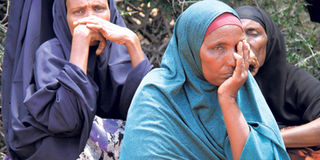Road construction that sparked inter-clan war

PHOTO | FILE Relatives mourn their kin killed in the inter-clan clashes in Wajir.
What you need to know:
- The road, at Tarbaj area, is right at the boundary of Wajir and Mandera counties. And before the contractor set up a camp at the site, the bush around the area had to be cleared first.
- They all joined URP while their opponents sought elective seats through TNA. While Garre are few in Wajir, Degodia form about 35 per cent of the population in Mandera.
It all started as a dispute over a boundary when the Wajir county government embarked on construction of an abandoned road.
The road, at Tarbaj area, is right at the boundary of Wajir and Mandera counties. And before the contractor set up a camp at the site, the bush around the area had to be cleared first.
But the presence of a team from Degodia on the Wajir side clearing the bush immediately raised suspicions among the Garre clan from Mandera. They believe the road is in their territory.
For years the Garre and the Degodia — both clans of the Somali community — have fought over political dominance and control of resources.
That is why the construction of the road rekindled the age-old rivalry as the Garre saw it as an attempt by their rivals to encroach on their territory.
The conflict between the two clans escalated last year after the General Election. The Garre had managed to sweep all the key positions in Mandera after entering into a political alliance with other clans.
They all joined URP while their opponents sought elective seats through TNA. While Garre are few in Wajir, Degodia form about 35 per cent of the population in Mandera.
So after failing to capture any key seat in the devolved government, they started alleging a plot to marginalise them and eventually force them out of Mandera.
As an assistant director at National Cohesion and Integration Commission (NCIC), Mr Guyo Liban, who is in charge of the Reconciliation docket recalls, the Degodia wanted Garre to surrender the Mandera North parliamentary seat to them.
“They also wanted them to surrender two county representative positions so that they stop feeling marginalised since they had no representation in the national or county assembly,” Mr Guyo, who has been involved in peace initiatives involving the two clans, explains.
Previously, Degodia had held the Mandera North parliamentary seat, now renamed Mandera Central. During the time Mr Abdikadir Mohammed, a Degodia, won the elections beating his closest rival Billow Kerrow. Mr Kerrow is a Garre and his community had fielded another candidate. So in the last polls, Garre were careful not to lose the seat.
Bashir Haji Abdulahi, who lost the seat to Adan Mohammed Nooru, a Murulle, had petitioned the elections but lost. The Murulle had teamed up with the Garre in the last elections.
Garre, however, could not give in to any of the demands. When forming his county government, Mandera Governor Ali Roba, Mr Guyo explained, appointed two Degodias to his cabinet.
But they still felt dissatisfied after the governor failed to name one of their own in the county’s Public Service Board. “Their argument was that the board, which conducts interviews for all the county jobs, may lock out the Degodia,” Mr Guyo further explains.
But after months of violent conflict, NCIC brought all leaders from North-Eastern region together under the chairmanship of Garissa Senator Yusuf Haji.
SIXTY KILLED
They formed Mandera Initiative Council that eventually brought to an end the bloody violence.
The boundary issue has now re-ignited the conflict that has left at least 60 people dead since early last month when the fighting started. The Garre had questioned the motive of constructing the road in Tarbaj after claiming it was cutting through their territory and attacked workers clearing the bush to pave way for the construction. This is how the fighting started as the Degodia retaliated and the fighting has continued.
“There is a lot of mistrust and hatred among the two clans and since there is no communication line; any conflict will easily ignite violence,” Mr Guyo told the Sunday Nation in an interview in his office. NCIC had informed the government of the tension between the two clans in April when the road construction started but no action was taken.
It is unfortunate for Wajir as the war is for the first time being fought on their soil and as the governor, Ahmed Abdullahi, points out, it is a Mandera conflict that has spilt over into their territory. “This is not our conflict, it is a Mandera conflict that has spilt over into Wajir,” the governor, who is a Degodia, said in a telephone interview.
But his Mandera counterpart, Mr Roba, does not believe so.
“This is a sporadic conflict whose current origin is Wajir-Mandera boundary,” he says, insisting that the conflict is a spill-over from Wajir to Mandera. He blames his Wajir counterpart for failing to stop the construction of the road after it sparked tension.
How should the conflict be addressed?
Mr Abdullahi is convinced that the problem would easily be addressed by implementing Mandera Initiative Council’s resolutions that recommended a cross-border process and effective disarmament in the region.





